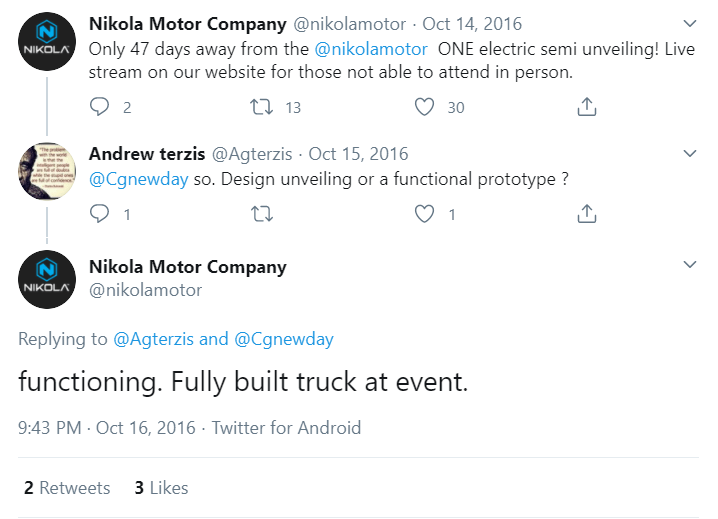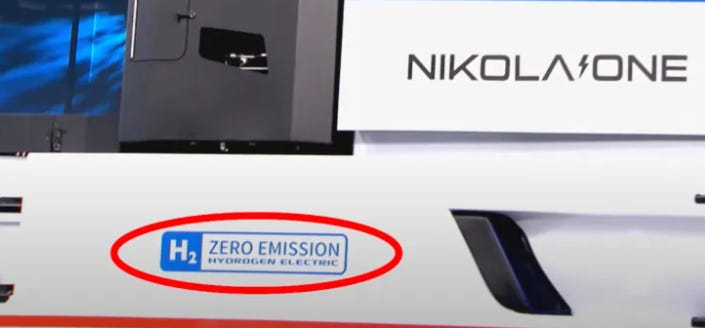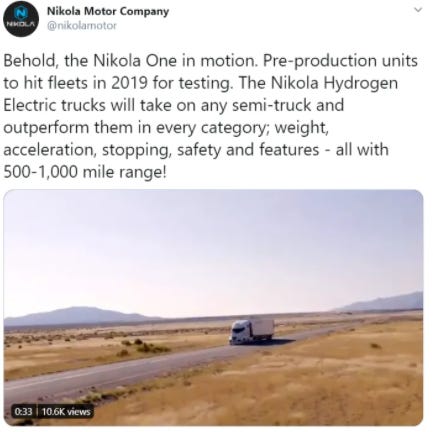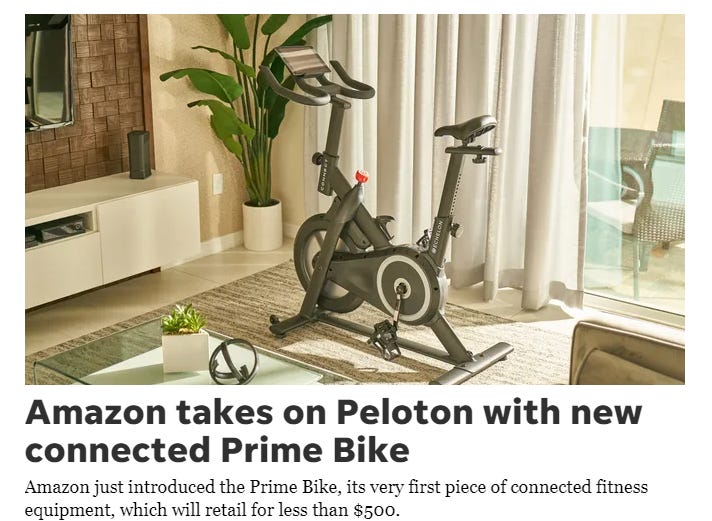Nikola
Nikola is a car company that you probably hadn’t heard of until this year, if at all. It’s not owned by Tesla, though you could be forgiven for thinking so - and perhaps the confusion is intentional.
What Nikola makes, instead of passenger cars, are tractor trailer trucks that ran on - depending on when you asked - natural gas, or hydrogen. Oh, also a personal recreational “offroad vehicle” for some reason.
On September 10th, a company called Hindenburg Research released a report on Nikola Motors. In it, they make the extremely well-documented case that Nikola is, in fact, a complete fraud. They claim Nikola does not make working hydrogen-powered trucks, and that nearly all of their other claims are complete fabrications. It is a long read, but I read it, and it is wild. Here’s a summary.
The founder of the company, Trevor Milton, had been involved in a couple other businesses before Nikola, and they didn’t end well:
Trevor’s initial foray into alternative energy vehicles was a company called dHybrid, Inc.
[…]
Shortly after launching dHybrid, Trevor contacted Jerry Moyes, CEO of Swift Transportation to market dHybrid’s conversion technology, according to a source familiar with the company.
[…]
The deal immediately hit roadblocks, as dHybrid failed to deliver on its agreement. Swift filed a lawsuit in mid-2012. A subsequent amended complaint alleged that only 5 trucks had been delivered instead of the promised 10, that the performance of the trucks didn’t to live up to the initial promises, and that capital had been misappropriated by dHybrid’s officers.
His company dHybrid received $2 million in investment capital to convert 10 trucks to run on natural gas for its primary investor, Swift Transportation. They didn’t deliver the trucks, and spent some of the money on personal expenses. Not off to a good start.
Undeterred, Milton continued to pitch dHybrid as a compressed natural gas - CNG - juggernaut, telling other companies he had contracts worth $300 million, but they weren’t interested, and Milton was forced to seek a buyout. That didn’t work either, because once he’d signed a term sheet with a company called sPower, that fell apart due to false promises:
Shortly after, when dHybrid disputed sPower’s findings, sPower filed a lawsuit alleging:
dHybrid had not, as represented, completed development of the dHybrid System.
Seems bad! Later that year, Milton and his father started a new company called dHybrid Systems - not to be confused with regular old dHybrid - and continued to do business while claiming the accomplishments of his prior, failed company. After two years of searching for a buyer, manufacturing company Worthington Industries bought dHybrid Systems for $16 million dollars.
Milton then used his leadership role at Worthington to start negotiating deals on behalf of his new venture, Bluegentech, which would later become Nikola. Keeping all of this straight? I barely am.
In 2016, Bluegentech became Nikola and came out of “stealth mode” to announce it was building an electric semi truck, called the Nikola One. Milton began to ramp up his lies:

Milton claimed repeatedly that the demo truck would be fully functional:
“For every doubter out there that said there’s no way this is true. How can that be possible? We’ve done it. It’s my pleasure to actually let you guys enjoy the night, see the truck, know it’s real, touch it, feel how sturdy it is. You’re going to see that this is a real truck. This is not a pusher. Thank you so much everyone!”
What’s a “pusher” you might be asking? It’s an industry term for a non-working vehicle prototype that needs a push to get moving. Foreshadowing. Anyhow, in the mean time Nikola had also been claiming their natural gas fuel technology was 10-15 years ahead of anyone else. Then, two weeks before the Nikola One truck unveil, they suddenly pivoted to hydrogen gas as the fuel source, as you would if you had groundbreaking energy tech. How did they make such a quick pivot?
Trevor had H2 stenciled on the side of the Nikola One despite the reality that the Nikola One contained a turbine designed for natural gas and absolutely zero hydrogen technology whatsoever, according to our sources.

Excellent. Then, after the big unveil, Nikola stopped working on the One. Instead they partnered up with Bosch, the German manufacturing giant, to build a hydrogen-powered truck for them. However, Milton relied on public hype to maintain Nikola’s access to investment partners, so he decided he needed a stunt in 2017. You’ll never guess what he did:

A video of the Nikola One, driving on the road! A miracle! How did he pull it off?
The deception involved in the production of this video appears to have been elaborate. The company scouted a remote section of road on the Mormon Trail just to the south of Grantsville, Utah, which we have since located.
This section of road is lightly used and features a 2-mile-long perfectly straight stretch with a consistent 3 percent grade–plenty of length and enough of a slope to get a motorless truck rolling.
Yesssss. I love it. Hindenburg Research even sent their own investigator out to test it and the results were incredible:
An investigator sent to the exact site used by Nikola for their video tested the hill in an SUV by parking the vehicle at the top, then rolling from neutral. He was able to hit a top speed of 56 mph and rolled for approximately 2.1 miles.
Milton didn’t just unveil a pusher, he took it to another level. He pioneered the roller. If Nikola had put half as much effort into developing its trucks as it did staging publicity events, it might have been successful.
But, alas. Milton and Nikola jumped from project to project, from wild claim to wild claim over the next two years. They unveiled an offroad vehicle that was immediately scrapped due to design issues. Milton boasted the Nikola headquarters had huge solar panel installations on the roof when a simple Google Maps check showed it did not.
In late 2019, Nikola tried to acquire a battery company called ZapGo, claiming in press releases that their tech would catapult the company ahead of Tesla and into the world of smart battery tech:
“This is the biggest advancement we have seen in the battery world,” said Trevor Milton, CEO, Nikola Motor Company. “We are not talking about small improvements; we are talking about doubling your cell phone battery capacity. We are talking about doubling the range of BEVs and hydrogen-electric vehicles around the world.”
Uh huh. Well, there was a slight problem with the president of ZapGo:
Had anyone at Nikola merely Googled the President of ZapGo, Charles Resnick, they would have found that 6 months earlier Resnick made national news for allegedly conning NASA through a scheme to use his expense account to hire numerous prostitutes. Resnick pled guilty in January 2020.
Every time I think this story cannot get more preposterous, well, it does. ZapGo was bullshit, the deal was a flop, but Nikola didn’t walk back its press releases, and instead stopped talking about batteries entirely.
Okay, we’ve made it to 2020. In June, Nikola went public via what’s called a reverse merger - it didn’t go through the standard IPO process and spend time talking to investors about its technology - it utilized some financial shenanigans to get itself immediately listed on the stock market. Investors went wild for a company they’d never heard of before but sounded like Tesla, claimed to have incredible technology - cheap, renewable hydrogen batteries with massive storage capacity. Who wouldn’t be excited?
Also, who was helping Milton run Nikola? Who were the super geniuses behind their mind-bending scientific advances?
We expected to find that Nikola had hired a world-renowned scientist to lead its revolutionary hydrogen efforts. Instead, it appears Nikola has appointed Trevor Milton’s little brother, Travis, as the Director of Hydrogen Production/Infrastructure.
What were Travis’s qualifications? He’d worked construction in Hawaii for 5 years. Who was the guy in charge of building out the hundreds of hydrogen charging stations Milton claimed the company would dot the countryside with?
For this task, the company chose Dale Prows, who is described at the 13:20 mark in a video produced for investors ahead of the company going public, as “one of our hydrogen experts.”
Prows joined Nikola after spending almost 4 years as CEO and General Manager at a residential golf course in Idaho.
Not exactly inspiring. Milton was able to carry on the charade through early September, when the company signed a strategic partnership with General Motors, a huge coup. GM took an 11% stake in Nikola worth $2 billion dollars, valuing the company at an eye-popping $20 billion. Milton was now a billionaire, and his family members had over $110 million in company stock. But, they didn’t have any products? They had contracted out the construction of their flagship truck to Bosch, and other companies made their power cells and turbines. Ah well, no matter.
Then, September 10th, Hindenburg Research uh, exploded onto the scene. Within 5 days, the Department of Justice and SEC announced investigations into Nikola. Milton claimed it was all nonsense, and insisted they were cooperating with investigators. And theeeeen:
Sources close to the embattled fuel cell truck manufacturer are reporting that founder Trevor Milton has resigned as executive chairman of Nikola Motor (NASDAQ: NKLA) and has departed the company effective immediately.
He will remain as one of the company’s largest shareholders, but will not have a say in how the company is managed going forward. Sources tell FreightWaves that the decision was Milton’s, in an effort to protect the company and his investment. Milton owns approximately 82 million shares or 20% of the company, worth about $2.8 billion.
What will happen to Milton? The whole situation smacks of Theranos, but, like most of these types of fraud cases, it may depend on who he stole from, and how much clout they have with the government.
Gold Smuggling
Back in July, I wrote about how cash smuggling into Latvia had been impacted by the pandemic. Another disruption in the cross-border smuggling ecosystem is, apparently, happening in India, which has seen gold smuggling drop precipitously:
Illegal shipments of gold to India are estimated to have slowed to a trickle of about 2 tons a month, and may total about 25 tons this year, according to N. Anantha Padmanaban, the chairman of the All India Gem and Jewellery Domestic Council. That compares with an estimate of as much as 120 tons last year, or about 17% of the nation’s annual demand, according to the World Gold Council.
O…kay? It turns out that, unlike Latvia, the motivations behind gold smuggling are not money laundering, and are mostly commercial in nature:
Smugglers of gold have benefited from record high prices and a 12.5% import tax that India imposes on shipments of the metal and additional local taxes, making illegal purchases cheaper. Jewelers have been seeking a cut of at least 50% in the import tax to reduce the inflows and legalize the imports.
Ahh, so they’re using the gold to make jewelry and not finance a shady criminal underworld. That’s…good, I guess? Sri Lanka has just lifted their gold import duty, making it far more likely gold will flow in across the southern border, and alleviating the need to stash it in luggage on inbound flights.
While attempting to find images for this piece, I ran across the news that people linked to the Chief Minister of the Indian province of Kerala were caught smuggling 66 pounds of gold in diplomatic bags bound for the UAE Consulate. I guess even government employees are getting in on the act!
Puppies

The pandemic has forced a lot of people to shelter at home, and has thrown a lot of consumer economies out of balance. Bike sales are through the roof as people seek new outdoor activities they can do while distancing. Webcams are sold out everywhere, as people switch to videoconferencing. Disinfectant wipes could be out of stock until next year.
Adopting a pet - dogs especially - has become difficult, as more and more Americans seek a shelter companion to shelter in place with. Sorry. Anyhow, while the increased interest in adopting dogs has been great for animal shelters, it’s 2020 and we can’t have nice things. Puppy scams are flourishing online:
The Better Business Bureau, an Arlington, Va., nonprofit that tracks consumer fraud, has recorded more than 2,100 online pet scams in the United States and Canada from mid-February to the end of July this year, up from 700 during the same period last year.
Fantastic. To make matters even more ridiculous, puppy scammers are using photos of pet influencers to trick unwitting victims:
For scammers, cute pictures are key. This has made online dog celebrities into unwilling accessories.
Tilly, a dog-show champion who lives in Maine, is frequently used as bait.
Photographs of Tilly and her children often show up on scam sites to entice would-be dog buyers, taken from their Instagram page without their owner’s permission.
Not Tilly! I am mad at the Wall Street Journal for this article, because instead of reading about scams I found myself down the rabbit hole of pet influencers:
Tilly and her brood are members of the Pugdashians, the name owner Lori Sirois gave to her glamorous pug family, inspired by the Kardashians. The Pugdashians dress in matching raincoats and striped shirts, and have over 200,000 Instagram followers—less than the Kardashians, but not bad for pugs.
Arrrrggghhh. I said last week that I do not follow influencers on Instagram, but I confess this is not entirely true - a friend of mine has an Insta-famous hedgehog. The world of hedgehog owners is, to put it mildly, a bit unusual. However! I only follow the account because it belongs to my friend. Am I part of the problem? Probably. I am sure the Pugdashians are good dogs, but the gimmick makes me cringe.
Putting my judge-y hat back on, can we talk about some of these breeds?
The most common breeds used as bait: Cavoodles—which are mixes between Cavalier King Charles Spaniels and poodles—and French Bulldogs, according to Australian authorities. Some U.S. states have issued similar warnings.
[...]
Norman the Pomsky, a Pomeranian and husky mix with over 100,000 Instagram followers, is another victim of identity theft.
I may get some heat for this, but can we stop the boutique dog breeding? It’s unnatural, and even though they might end up cute, they are far more likely to have health problems and get sick! Cut it out!
Not to be outdone by fake puppy scams on the Internet, people have taken to dognapping in the UK:
In some cases, prospective buyers are actually getting the dogs they dreamed of—it’s just that the dogs were stolen. High demand for lockdown puppies has led to a spate of dognappings. In mid-July thieves cut through fencing at a kennel in Stretham, a small town near Cambridge, U.K., and nabbed a West Highland Terrier, a Jack Russell and a Chihuahua, according to a police notice.
Please do not buy dogs online. If you cannot find one at a shelter, just wait. We’ll get over the dog mania and they’ll be available soon! It will be okay. Also, please do not steal dogs to sell on the Internet. What is wrong with people.
Prime Bike

Earlier this week, announcements about a “Prime Bike” from Amazon hit the news. It was a less expensive version of a Peloton, we were told, priced at $500, exclusive to Amazon Prime members.
A few hours later, though, Amazon stopped selling the bike, saying it wasn’t an Amazon product, or related in any way to Amazon Prime:
But Amazon told Forbes on Wednesday that Echelon "does not have a formal partnership with Amazon."
"We are working with Echelon to clarify this in its communications, stop the sale of the product, and change the product branding," it said.
I’ve written a lot about how Amazon runs what is essentially a huge, unregulated, third-party product marketplace. Counterfeit products and scams are everywhere on the website. This is the first time I’ve seen a company try to steal Amazon’s own brand to sell a product, though! Kudos to Echelon for their creative marketing campaign:
The $500 bike, previously called the Echelon Ex-Prime Smart Connect Bike, is listed as "currently unavailable" on Amazon, and the product name has been changed from "EX-Prime" to "EX-P."
Despite what Amazon would probably claim in court, they do not have exclusive rights to use the word prime, and maybe Echelon could have gotten away with it for awhile if they hadn’t issued press releases to major news networks about it. Ah well. Prime Bike burned brightly, briefly, and is now probably going to get buried by the people in charge of Amazon’s suggestion algorithms.
Don’t Build Cities in Africa
This is a tweet thread from a self-styled venture bro who decided, with his hedge fund friend, to go to Africa and…build…cities? This strikes me as a solution in search of a problem - no one in Ghana or Nigeria was asking for this. Sure, they’d be happy to take VC dollars from Americans and use it for community improvement, but what the fuck is a “charter city”? That’s not how cities work. This guy says it well:

Disrupting colonialism, how utterly American.
Short Cons
Bloomberg - “With 300,000 workers stranded on merchant ships, Bloomberg found dozens of labor violations that threaten seafarers’ safety, as well as the global supply chain.”
NY Times - “New research shows that minimum-wage violations spike as low-paid workers become more vulnerable and less inclined to complain.”
CNBC - “The U.S. Department of Justice on Friday charged six individuals who allegedly bribed Amazon employees and contractors, giving some third-party sellers an unfair competitive advantage on the company’s marketplace.”
ProPublica - “Staff at CSL Plasma, an industry leader, raised alarms about faulty masks as donors flooded in, but the FDA and OSHA were slow to act.”
Tips, comments or groundbreaking battery tech to scammerdarkly@gmail.com
